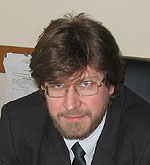© «Russia
in Global Affairs». №
2, July — September 2007
 Last year, U.S. political analyst
Last year, U.S. political analyst
Leon Aron offered a forecast in our journal about the future
development of Russia-U.S. relations. He said that people in both
countries should put on their “life jackets” and be prepared for
“some heavy rolling, pitching, rocking and seasickness.”
In recent months, we have witnessed
some hard turns in foreign policy. At first, it seemed that we were
taxiing toward a new Cold War; then the steering wheel suddenly
turned, leaving everyone perplexed about the Kremlin’s “peace
offensive.” And still, a hot election season and the finale of the
presidential election campaign are ahead of us.
Russia’s foreign policy cannot be
viewed in isolation from the situation inside the country. The
election campaign, gaining momentum in Russia, is having increasing
effect on Moscow’s international conduct. Will the power vertical,
built by President Vladimir Putin, survive after he is gone? Or
will the elite divide once again?
Andrei Okara analyzes the sources and
prospects of ‘sovereign democracy,’ the main ideological postulate
of the incumbent leadership in Russia. Vladislav Inozemtsev
foretells a bitter struggle for Putin’s political legacy, but not
before March 2008. This will happen later, it is predicted, when
the formal issue of power takeover has already been
decided.
Svetlana Babayeva points to the
emergence of a moral discourse in Russian politics and attempts to
figure out what effect it may have on the country’s development.
Ivan Sukhov evaluates the strength of Russia’s federal system,
which has gone through marked changes during the years of Putin’s
presidency.
And what is happening between Russia
and the leading Western states? The more one inquires into the
heart of the matter, the better one sees the complexity and
ambiguity of the situation. This crucial epoch, which began with
the downfall of Communism in the late 1980s, is far from over and
may still bring about serious upheavals. The creation of a new
model for the global system is of utmost importance as well,
Timofei Bordachev argues in his article.
Thomas Graham, who recently left his
service at the White House, holds that Russia and the United
States, the two superpowers of the previous epoch, cannot find a
common language, above all, for psychological reasons. Russia feels
stronger than it really is (and subconsciously senses this
contradiction), while the U.S. does not have confidence in its own
strength, although there are no grounds for such
self-disparagement. The author believes that the parties can
overcome their mutual diffidence only through close
cooperation.
The settlement of the Kosovo problem
will test the ability of the major powers to untie the intricate
knots that have hampered their mutual relations. Slovakia’s former
prime minister, Jan Charnogursky, calls on Moscow to take a
principled position and defend the rights of the Serbian minority.
Russian veteran diplomat Vladimir Kazimirov – who insists that the
crisis is not merely a local conflict, but a bitter juridical
conflict between two basic principles of international law –
provides further insight into the Kosovo issue.
Alexei Arbatov warns about a possible
revival of the Cold War spirit. A zero-sum game is out of the
question, he believes, because ambitious countries in Asia, not to
mention the sponsors of international terrorism, stand to gain from
a Russia-West rivalry. Along these lines, Gen. Andrei Novikov,
director of the CIS Antiterrorism Center, warns about the threat of
terrorists obtaining radioactive material and nuclear
technologies.
Alexander Lukin analyzes in detail the
situation in Central Asia, yet another potentially conflict region
where the interests of Russia, China and the United States overlap.
Mehdi Sanaie, professor at Teheran University, expresses Iran’s
apprehensions over Russia’s policy toward his country. Alexei
Malashenko writes about the difficult relationships between Moscow
and the Islamic world.
Sergei Sokolov discusses what Russia
should do to be best prepared for negotiations with the European
Union that could usher in a new fundamental agreement between the
parties. For now, the prospects of such negotiations remain
uncertain. Martin Gilman analyzes the prospects of the ruble
replacing the U.S. dollar as the international reserve
currency.
Meanwhile, Russia in Global Affairs
continues to keep a close watch on the situation in Ukraine.
Historian and writer Roy Medvedev discusses whether a real
nation-state can be built there, or whether the ethnic principle of
nation-building is ruinous for the country.
Our next issue will focus on election
passions in Russia; the phenomenon of successful states that fail
to follow Western democratic canons; the situation in various
neighboring countries of Russia; prospects for a “gas OPEC” as well
as a new Russia-EU treaty; and much more.










